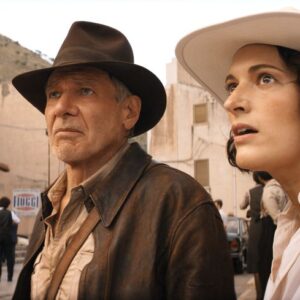About a year ago, I was sitting at a coffee shop when I had a great idea: instead of doing work, I should make a puzzle for a friend.
This particular friend is very sharp, and he loves puzzles. (To steal a joke from Dial ‘M’ for Murder—I call him my friend, because if I call him my lawyer, he charges me.) So I sent my friend-lawyer a simple word puzzle, and he solved it almost immediately. It wasn’t the least bit frustrating for him, which made it twice as frustrating for me. So I abandoned the idea of working completely and focused my attention on sending him a harder puzzle: a cross between a logic grid and a murder mystery. Much to my delight, my lawyer-friend couldn’t solve it. But my delight disappeared when I realized that the reason he couldn’t solve it was because it was broken.
I stormed out of the coffee shop, drove home, and began to work on a computer program that would generate these murder-mystery logic puzzles automatically. Soon, I would be able to generate thousands of puzzles—millions of puzzles!—much too many for my lawyer-friend would ever be able to solve. And that’s exactly what I did.
The next morning, I sent my lawyer-friend the first computer-generated murder-mystery logic puzzle, and not only did he solve it, he loved it. With his feedback, I made it into a daily online murder-mystery game called Murdle.
Once I shared it, other people loved it, too. A literary agent reached out to me and said she thought she could sell it as a book, and she was right! Now, three volumes of murdles are coming to bookstores all around the world, starting this June.
I got extraordinarily lucky. But I was helped by my background making immersive murder mystery theater. Eight years ago, I launched a show called the Hollywood Mystery Show. Each episode was a one-time-only performance of a mystery where not even the actors knew whodunit, because they were reading the script for the first time as they performed it on stage.
You might think this would hurt their performance. You’d be right.
So, we added a rule: whenever an actor made a mistake, the audience shouted “Drink!” and they took a drink on stage. This hurt their performance, too, but it also made them funnier. Not always to the audience, but to the other performers, at least. And the audience members who did come back came to every show, and they asked to be in it.
Slowly, we grew into a theater collective called the Hollywood Mystery Society. Since then, we have staged a variety of mysteries in a variety of places. We’ve done haunted houses in Brentwood mansions, dinner theater in Himalayan restaurants, and interactive whodunits in downtown movie theaters. By writing, staging, and hosting dozens of mysteries, I’ve learned five lessons absolutely essential for making a murder mystery work.
The first lesson is this: Make the clues obvious.
It was pretty easy to slip a crucial clue past the audience of the Hollywood Mystery Show: they were usually drunker than the performers. But ever sober readers can struggle. John Dickson Carr, the master of the locked-room mystery, wrote, “The best way to conceal a clue is to place it in full view and let the reader turn it over in his hands, as it were, without ever seeing its significance.” In the Mystery Show, we started making songs about the clues. In Murdle, I had to be very specific with the language, because the solver needs all of the clues in order to solve the puzzles. If they misinterpret one clue, they’ll get the wrong answer. But for Murdle, as in all mysteries, it’s not the clues themselves that should be hidden, but what can be deduced from those clues.
But clues alone are not enough to make a great mystery and that brings me to the second lesson: Good characters are better than good clues.
At a monthly murder-mystery dinner show we do called Murder at Tara’s, the audience is asked to choose between two women who might have murdered a man. More importantly, the audience is asked to spend an entire dinner hanging out with both of them. If they didn’t like the characters, their meal would be ruined!
It’s hard to remember many distinctive Agatha Christie clues, but many of her murderers spring to mind, and I will never forget Hercule Poirot or Miss Marple. People still watch episodes of Columbo, fifty years after they aired, not because of the great clue about the gunshot on the phone call, but because of Peter Falk playing the greatest American detective, and the Oscar-winning actors he went up against.
There are one-hundred puzzles in each of the Murdle books, so suspects and murderers come and go. But there are two people you are with the whole book: the rationally-minded Deductive Logico who solves the murders, and the esoteric Inspector Irratino who provides the hints (if you need them). Their relationship creates an emotional underpinning that’s hopefully a lot deeper than people are used to from their crosswords and sudokus.
Third lesson: Know who did it from the start!
G. K. Chesterton wrote that a good mystery is written “for the moment when the reader does understand, not merely for the many preliminary moments when he does not understand.” That moment of understanding must be planned from the beginning.
In the Hollywood Mystery Show, none of the actors knew who did it, but I always did, and the sooner I knew who did it in the writing process, the better the final script was. Once, while writing an episode, I wrote a few scenes before I knew the central mystery, and pretty soon, I’d written almost a whole show without knowing whodunit.
Suddenly, it was the day of the show, and I was feverishly rewriting the first act to add references to an evil twin. When the final twist was revealed, you should have heard the drunken jeers, which continued even during the after party.
That brings me to the fourth lesson: Write for your friends.
You don’t know what the faceless masses will like. You’ll never know. But you do know what your friends like. Or your family. Or your partner. And if you write something that you like, and they like, too, then other people might like it, as well.
I started the Hollywood Mystery Show for my friends who performed it in. And I made Murdle for my lawyer-friend to procrastinate. Both turned out to be the best decisions I could have possible made. One gave me an LA family, and the other gave me a book series, but they both helped me have fun with my friends.
So that’s my most important piece of advice, but my final piece is important itself. I learned it just after selling this book series, and I pass it along to you to hopefully avoid my fate:
Before you ask your lawyer-friend for advice, ask what he charges.
***


















